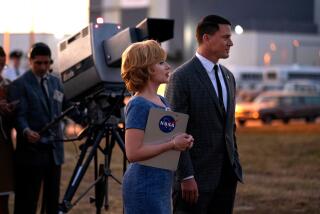Apollo 11 Moon Landing
- Share via
Re “Race to Moon Was a Giant Leap for Engineers Too,” July 18: For a lead design engineer during the race to the moon in the ‘60s, TRW was the place to be. The two most exciting events I experienced as part of the lunar excursion module descent engine design team at TRW were the first lunar landing and the Apollo 13 rescue, where the LEMDE was used to get the astronauts out of space into a transfer orbit to be able to land safely back on Earth. On both missions it was the deep throttling capability of the rocket engine that allowed it to perform its mission.
Until their safe landing on the moon, we were all there with the astronauts, sweating out the landing. For the Apollo 13 rescue, the LEMDE was put to a task that involved a completely different duty cycle from that which it was designed for. Without the benefit of today’s complex computers and computer-aided design capabilities, long hours were expended studying the outcome. The bottom line was, this was the only way to get the astronauts home and the direction was go.
It was a proud day at TRW when the Apollo 13 astronauts personally thanked us for the success of the LEMDE and also the abort guidance system on board the LEM, which both played such a great part in their safe return.
SANDY FRIEDFELD PE
Palos Verdes
*
Ayn Rand’s paean to “the absolutism of reality” is sadly off the mark (Commentary, July 16). She ignores the emotional component of any human endeavor. The challenge began with President Kennedy’s stirring call to put a man on the moon by the end of the decade. It was fulfilled by the efforts of the astronauts and the thousands of ground workers who supported them. Their courage, dedication and hard work--none of which were programmed by logic--made the program fly.
They succeeded by learning from their mistakes, such as the tragic deaths of the Apollo 1 crew, and by improvising when necessary. If they didn’t know the facts, such as the consistency of the moon’s soil, they guessed. The reason the lunar and command modules had pilots was to take unforeseen circumstances into account--as Apollo 13 so grimly showed. Apollo 11 wasn’t a triumph of reason alone. It was a triumph of the human imagination, spirit and reason working together, as they usually do.
ROBERT SCHMIDT
Culver City
More to Read
Sign up for Essential California
The most important California stories and recommendations in your inbox every morning.
You may occasionally receive promotional content from the Los Angeles Times.













